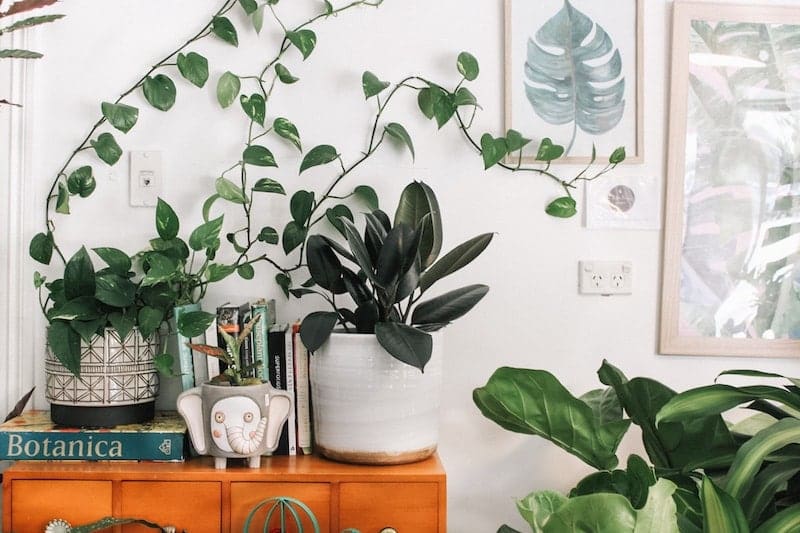The well-known Rubber Plant or Ficus Elastica is mildly dangerous to cats. There are many different varieties of a rubber plant, including both the American and the Japanese versions. The Rubber Plant is slightly less toxic than other houseplants and causes more mild symptoms.
What Happens if a Cat Eats a Rubber Plant?
An American rubber plant is not poisonous to cats (or dogs). However, your kitty may have an upset stomach after eating this plant. Some cats have sensitive stomachs and will vomit after eating anything unfamiliar. Felines are also obligate carnivores, and their digestive systems are designed to eat meat, not whole plants.
If your cat throws up once or twice and then goes back to eating normally, you shouldn’t be concerned. Additionally, diarrhea that passes quickly and resolves on its own is not a reason for alarm.
Although the American rubber plant is not a poisonous species, a plant with a similar name, the Indian rubber plant (Ficus benjamina), is toxic to cats. This plant is also called a fig or weeping fig. Call your vet immediately if your cat eats an Indian rubber plant.
![]()
[et_pb_section fb_built=”1″ _builder_version=”4. 16″ da_disable_devices=”off|off|off” global_colors_info=”{}” da_is_popup=”off” da_exit_intent=”off” da_has_close=”on” da_alt_close=”off” da_dark_close=”off” da_not_modal=”on” da_is_singular=”off” da_with_loader=”off” da_has_shadow=”on”][et_pb_row _builder_version=”4″ 18. 0″ _module_preset=”default” global_colors_info=”{}”][et_pb_column type=”4_4″ _builder_version=”4. 18. 0″ _module_preset=”default” global_colors_info=”{}”][et_pb_post_title meta=”off” featured_=”off” _builder_version=”4. 18. 0″ _module_preset=”default” title_level=”h2″ global_colors_info=”{}”][/et_pb_post_title][/et_pb_column][/et_pb_row][et_pb_row _builder_version=”4. 16″ background_size=”initial” background_position=”top_left” background_repeat=”repeat” global_colors_info=”{}”][et_pb_column type=”4_4″ _builder_version=”4. 16″ custom_padding=”|||” global_colors_info=”{}” custom_padding__hover=”|||”][et_pb_text _builder_version=”4. 18. 0″ _module_preset=”default” text_text_color=”#000000″ global_colors_info=”{}”]With all of us spending so much time inside during COVID19, plant ownership is definitely on the rise. Considering this, it’s especially crucial that we make sure any new plants we bring into our house are safe for our pets! [/et_pb_text][et_pb_text _builder_version=”4″ 18. 0″ text_font=”Raleway||||” text_text_color=”#000000″ text_font_size=”18″ header_6_text_color=”#848484″ global_colors_info=”{}”].
When consumed, this lovely leafy plant typically upsets the stomach, resulting in vomiting and diarrhea; however, more severe symptoms can include weakness and lack of coordination.
Because they require little upkeep, rubber tree plants are especially well-liked, but they are actually poisonous. They cause irritation of the mouth and vomiting and diarrhoea. Fortunately, they are not overly toxic, but they should still be acknowledged.
[/et_pb_text][/et_pb_column][/et_pb_row][/et_pb_section][et_pb_section fb_built=”1″ custom_padding_last_edited=”off|desktop” _builder_version=”4. 17. 3″ background_color=”#614EE1″ custom_margin=”||||false|false” custom_padding=”||||false|false” custom_padding_tablet=”50px|0|50px|0″ da_disable_devices=”off|off|off” global_module=”4927″ locked=”off” global_colors_info=”{}” da_is_popup=”off” da_exit_intent=”off” da_has_close=”on” da_alt_close=”off” da_dark_close=”off” da_not_modal=”on” da_is_singular=”off” da_with_loader=”off” da_has_shadow=”on”][et_pb_row _builder_version=”4. 16″ background_size=”initial” background_position=”top_left” background_repeat=”repeat” global_colors_info=”{}”][et_pb_column type=”4_4″ _builder_version=”4. 16″ custom_padding=”|||” global_colors_info=”{}” custom_padding__hover=”|||”][et_pb_text _builder_version=”4. 17. 3″ background_size=”initial” background_position=”top_left” background_repeat=”repeat” text_orientation=”center” background_layout=”dark” module_alignment=”center” global_colors_info=”{}”].
Please schedule an appointment with us at MyVet as soon as possible if you think your pet may have consumed any toxic plants. If the plant has recently been consumed, we can frequently induce vomiting, which, when done promptly, can completely prevent any signs of toxicity. As usual, avoiding treatment is always preferable to having to do it.
My Cat Ate a Rubber Plant: When to Call a Vet
You should watch your cat for a while if they consume an American rubber plant or any other non-toxic houseplant. Try to keep them under observation in a small, safe space. Reach out to your veterinarian or visit the closest animal hospital if your feline:
- Vomits repeatedly
- Refuses to eat or drink anything at their next mealtime
- Acts lethargic or weak
- Has uncontrolled diarrhea
- Ate a plant that you can’t identify
If you have any concerns about your cat’s health, don’t be afraid to contact your veterinarian.

FAQ
Are rubber plants safe for cats?
How are rubber plants toxic?
How toxic is Ficus for cats?